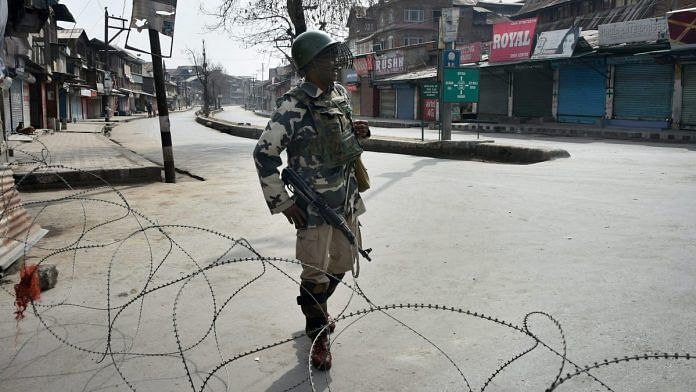While both the BJP and the Congress have raised the national security pitch in their Lok Sabha campaigns, none of the political parties wants to talk much about the CRPF.
The force that is at the forefront of fighting insurgency in Kashmir, central India and the northeast suffers from lack of training and adequate infrastructure.
Recent reports now say that a top CRPF officer had pointed out these shortfalls in a series of letters to the CRPF headquarters barely months before the 14 February Pulwama terror attack.
While lack of infrastructure, as pointed out by the officer, is indeed a problem, repeated setbacks point towards a systemic failure and the inability of the leadership to comprehend the training needs, analyse performance gaps and take remedial measures.
Also read: BJP & Congress manifestos offer a security policy high on emotions, low on substance
IPS officers to blame?
The standard and orientation of training in all branches of the Central Armed Police Forces (also known as paramilitary forces) has deteriorated over the years and leaves much to be desired.
The founders of these forces had put in place a well-thought-out training structure. There are training institutions catering to requirements at force, zonal and unit levels. It is the lackadaisical attitude of the IPS officers leading these forces that has led to the drop in the training standards, including in the Central Reserve Police Force (CRPF).
Seeped in police culture, IPS officers continue to consider postings to training institutions as ‘punishment posting’ and view training as a peripheral activity, which has led to the current state of affairs.
My own experience in the Border Security Force (BSF) tells me that it is only a rare IPS leader who comprehends the necessity of good training for the success of operations.
Also read: IPS dominance in top paramilitary posts must end. Chidambaram-led panel right in saying so
Stuck with outdated material
There is no investment in research and upgrade of the training methodology and literature. One would be surprised to find that the BSF till about a decade ago did not have training literature on strategic and operational aspects of border management.
The reference material prepared in 2008-09 has not been updated in spite of the several changes in the operational environment, like signing of the India-Bangladesh land boundary agreement or introduction of the ‘less lethal strategy’ in 2011-12, under which troops must exercise restraint in use of lethal force along the border with Bangladesh.
The training programmes remain archaic and must be upgraded at the earliest to align with the demands of the modern-day operational environment. Paramilitary forces need to be trained in operating against militants in the prevailing circumstances in Kashmir and Maoist-hit areas.
Similarly, there is no understanding of how management of fenced borders works and therefore the BSF has not been able to develop the right methods for training in that area.
No time for training
Another reason for the dilution of the training standards is the rapid expansion of these forces in the last few years, which has put heavy burden on the existing infrastructure and staff, affecting the quality of supervision and leading to an adverse trainer-trainee ratio. The situation should improve with the stabilisation of the force levels.
Yet another reason for the slow response rate among troops during conflict, which ultimately leads to heavy casualties, is the total breakdown of the company collective training system in these paramilitary forces. Each company of the unit is officially required to undergo this training once a year. But this is not possible because the companies are rarely, if at all, available. They are often given non-combat duties round-the-year, which also includes election responsibilities.
One can understand the compulsion of the government to utilise these forces for assembly and parliamentary elections, but they are routinely deployed for even panchayat elections.
For example, 400 companies of Central Armed Police Forces (CAPF) deployed in Kashmir during the panchayat elections continue to be there long after the polls are over. These companies are unlikely to be released until the parliamentary and the assembly elections in the state are not over.
Also read: CRPF’s new Bastariya battalion to tackle Naxals is more a military fix than political
The CAPF or paramilitary forces have an important role in the national security matrix of the country. They are mandated to guard borders, handle internal security situations and also assist defence forces in the eventuality of a war. Lack of quality training will play havoc with their operational efficiency, which can seriously compromise national security. Leaders of these forces need to take immediate steps to correct the situation.
The author is a retired additional director general of Border Security Force.




Sex symbol topics are much better than these boring topics.
Only Mr Sood left to comment on a Naxalophile news portal.
And all problems of CRPF started from May 2014 onwards…. LoL